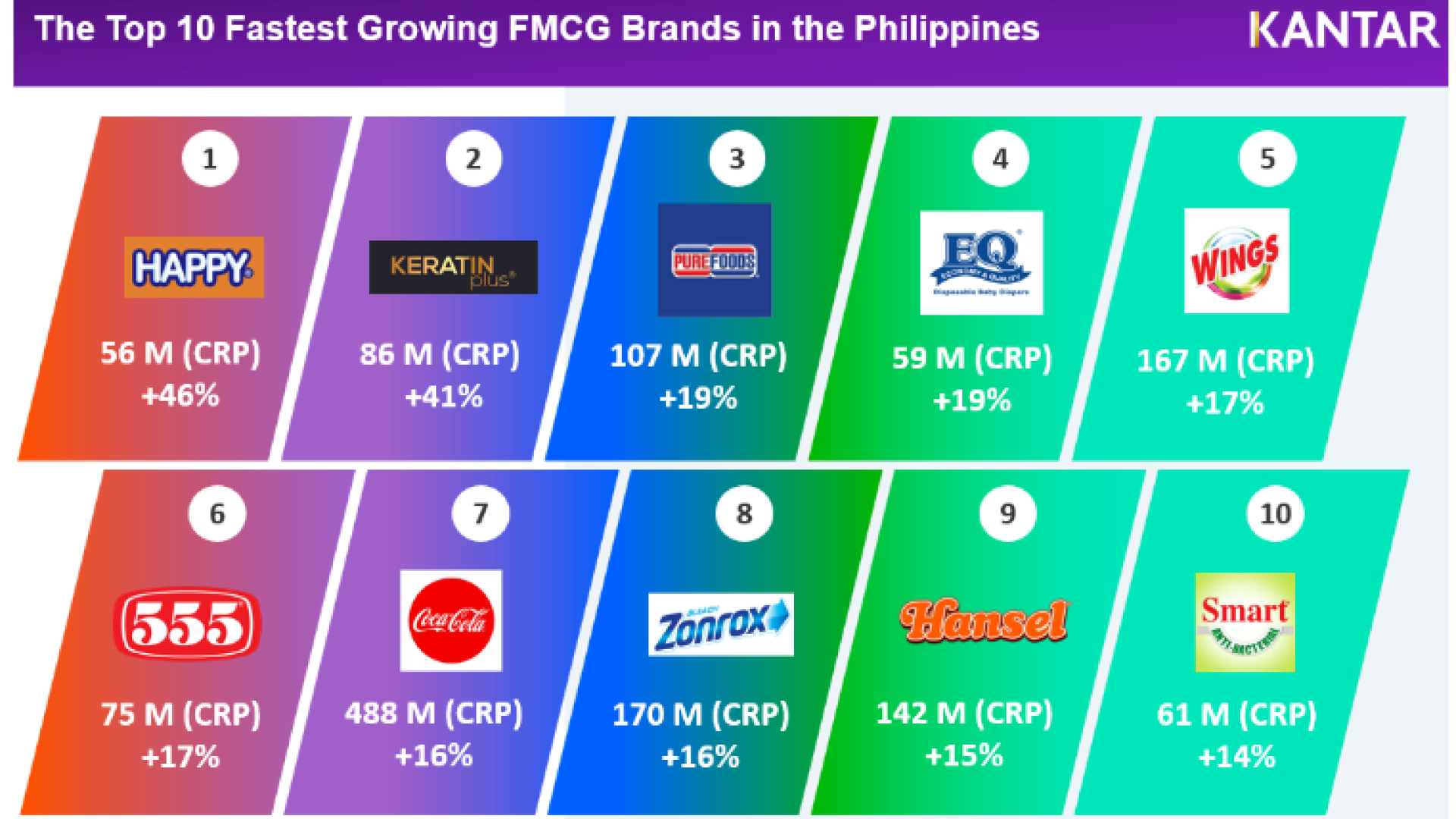Ten FMCG (Fast-Moving Consumer Goods) brands across health & beauty, home care, food, and beverage mega-sectors have been identified by Kantar, the world’s leading marketing data and analytics company, as the “fastest growing” in the Philippines, according to the 2023 edition of its Brand Footprint report.

The Brand Footprint, which is based on Kantar’s annual analysis of a brand’s strength vis-à-vis the choices Filipino shoppers make for their households, reveals that local diaper brand Happy is the fastest growing brand in the country in 2022. Happy was able to highlight its value and expand its presence, especially in sari-sari stores, allowing it to reach one million homes. Kantar’s data shows that Happy garnered 56 million Consumer Reach Points (CRP), up by 46% from the previous report.
Lourdes Deocareza-Lozano, New Business Director at the Worldpanel Division of Kantar Philippines, explains that the Brand Footprint ranks the FMCG brands based on their CRP. This measure combines population or the number of households in the country; penetration or the percentage of households purchasing the brand; and consumers’ choice or the number of times the brand is being chosen by Filipinos over the course of 12 months.
Following in second with a 41% increase in CRP is personal care brand Keratin Plus. Similar to Happy, Keratin Plus has attracted Filipinos shoppers that frequent sari-sari stores, especially with the availability of their hair care products in sachet formats. In fact, in 2022, the brand gained 2.9 million shoppers who are looking for products to experience salon-level treatment at home.
Meanwhile, from the food category, Purefoods comes in third in the list with 107 million CRP. This growth, according to Kantar, is driven by reaching 1.6 million Filipino homes that patronize their frozen meat and canned meat products.
EQ (diapers) (59 million CRP, +19%) and home care brand Wings (17% increase resulting to 167 million CRP) rounded up the Top 5 ranking.
Deocareza-Lozano adds that the Brand Footprint aims to capture the key moment when Filipinos, especially those in charge of the needs of the family, purchase their FMCG needs. “Filipinos have been spending more for their FMCG needs, especially in 2022 when we came out of the pandemic and our lifestyles began to shift and return to normalcy. With various life challenges faced by Filipinos, they are coping by reviewing their product choices. What we’re seeing is that Filipinos are looking for brands that provide value for their families. They are looking for products that fit their needs best at this time. This presents a huge growth opportunity for all FMCG brands in the Philippines.”
Completing the Top 10 Fastest Growing Brands are food brands 555 (6th with 75 million CRP, +17%) and Hansel (9th with 142 million CRP, +15%); beverage brand Coca-Cola (7th with 488 million CRP, +16%); and home care brands Zonrox (8th with 170 million CRP, +16%), and Smart (10th with 61 million CRP, +14%).
Opportunity for brands of all sizes to grow
Despite headwinds of inflation, Deocareza-Lozano says that 61% of brands in the country are growing. Majority of brands, whether small or super brands, are getting it right and are able to penetrate more Filipino homes. It is interesting to note that 57% of small brands, or those brands that are reaching less than 10% of Filipino shoppers, have enjoyed growth in the past year. Therefore, Kantar is encouraging FMCG brands to seize this growth opportunity.
“Whether an FMCG player is a new or emerging one, Kantar can help them understand the shopping preferences and behaviors of Filipinos. One of our benchmarks for success is whether brands are gaining new shoppers. In our recent Brand Footprint study, we are seeing that growing brands are gaining an average of 1.6 penetration points. With these insights, they will be able to set better targets for the coming year,” shares Deocareza-Lozano.
In addition, Kantar lists four levers for growth that brands can use to maintain a constant level of penetration amidst a growing population. Deocareza-Lozano enumerates these as: more presence (increase in number of locations closer to shoppers), more categories (expanding product portfolio to attract buyers), innovation (introducing new variants based on new needs of shoppers), and more moments (staying relevant and available in as many moments of consumption as possible).
The 2023 Brand Footprint report covered 5,000 households for 12 months ending October 2022 versus the same period the year before.





